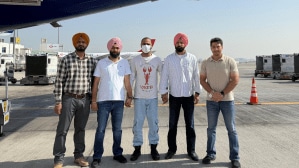The truth police
The Truth and Reconciliation Commission. Sounds rather Orwellian in this age of presidential lies and prosecuting truth. No more it is th...

The Truth and Reconciliation Commission. Sounds rather Orwellian in this age of presidential lies and prosecuting truth. No more it is the grand performance of the lie on a stage erected on the controlled conscience of the masses.
And no more it is the tyranny of truth as defined and implemented by the Leader. It is the age of trivia: minimalist truth as a source of individual humiliation; semantically manipulated lies as a method of survival. So welcome to South Africa, where the real thing is out there in the market of bitter memories, memories of hate and revenge, of martyrdom and murder, in black and white. The just published report contains few surprises, for the inclusion of the ruling African National Congress (ANC) as a violator of human rights should not come as a great surprise. And all the usual suspects are there: P.W. Botha, Winnie Madikizela-Mandela, Mangosuthu But-helezi… The listed crimes and criminals only bring out certain stereotypes from history. The ANC, which in vain tried to blockthe publication of the report, is still saddled with the historical burden of struggle and deprivation. But the victimhood of racial discrimination had not always been passive. The passion for freedom occasionally expressed itself as the fury of retribution. For P.W. Botha, the high priest of apartheid, and the one who has never accepted the very existence of the commission, feels no guilt, for the gravity of self-righteousness is so strong. He almost echoes the deposed dictator in Julian Barnes’ The Porcupine — at the end of the trial, he cries out to the prosecutor: I sentence you! And you know that Winnie Mandela’s personalised revolution was deadly, that Buthelezi’s Inkatha freedom movement was violent. So what will you do with this truth mined from the past? There is scope for amnesty, and there is evidence for prosecution. Or, it is the beginning of a celebration of national rancour.
Still, despite the volume of the report and its details, it is a redundant commission. For, the truth was neverin doubt. Apartheid was a crime against conscience, its politics of racial segregation was state-sponsored legitimisation of hate. Of reconciliation, it was achieved more than four years ago without the assistance of a commission. It was achieved with the modesty of a white redeemer and the greatness of an ex-prisoner. Wasn’t it pure reconciliation when De Klerk realised the crimes of his inheritance, when he accepted the legitimate rights of the dispossessed blacks? Wasn’t it reconciliation when Prisoner Mandela became President Mandela, with that rare legacy of suffering and sacrifice — the president of living truth? Then what was this commission all about, with its show trials, with its public parade of guilt? It has opened the trapdoors of history, and the ghosts are marching out.
It seems the trial of truth has become the second stage of liberation. As a national spectacle, it achieves very little except the imposition of guilt, which can hardly contribute to the process of reconciliation in a dividedsociety. It doesn’t mean that the killer should be ignored. For South Africa may have its own Karadzics and they should not be ignored. But the free world can do without the truth police. As a prisoner and fighter, Nelson Mandela lived in truth. In the country of President Mandela, does truth require an arbiter?






- 01
- 02
- 03
- 04
- 05

























